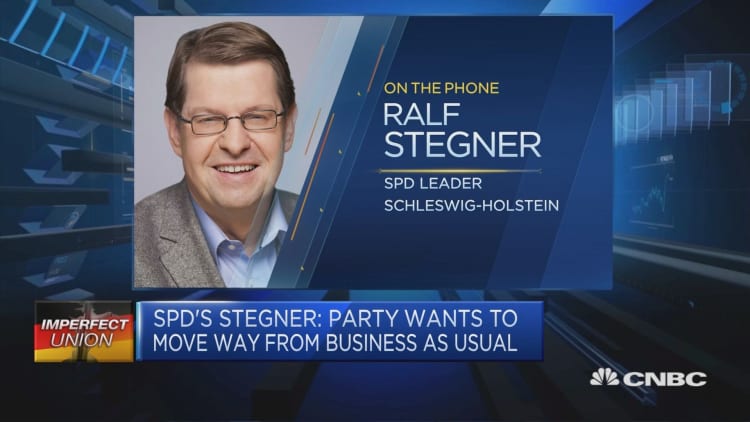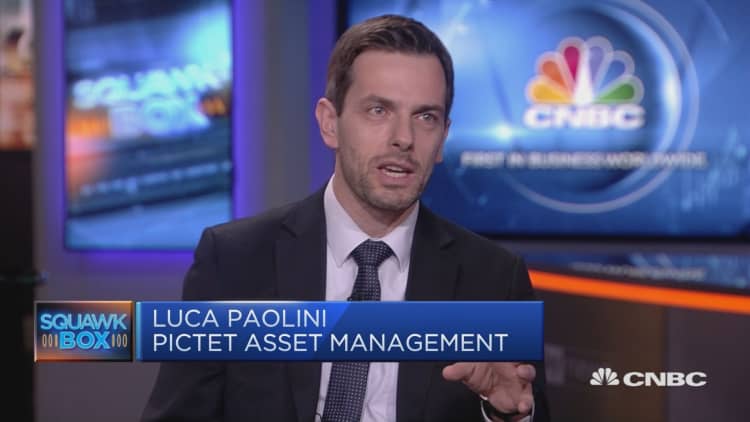Germany's ruling coalition government is hanging by a thread, potentially having major implications on the country's spending habits and wider reforms across the continent.
On Saturday, Chancellor Angela Merkel's junior coalition party — the Social Democrats (SPD) — elected new leaders in a vote that will be confirmed later this week. Norbert Walter-Borjans and Saskia Esken, who ran on a joint ticket, want to renegotiate some of the terms of the ruling agreement with Merkel's conservative party, the Christian Democratic Union of Germany (CDU).
"The new leaders are likely to challenge the status quo in the federal government. In particular, Esken has positioned herself in favor of an exit from the grand coalition," Ricardo Garcia, chief euro zone economist at UBS, said in a note to clients Monday.
Saturday's result is set to open the way for tough talks between the two partners. The new socialist leadership has said they would like to see more ambitious plans on climate change, higher minimum wages, as well as different fiscal rules.
"We don't think that all of these will be acceptable to the CDU/CSU, in particular to its more conservative members," Garcia added.

At 'odds' over spending
Under Merkel's leadership, Berlin has rigorously pushed for a balanced budget. Its fiscal prudency respects the German constitution, where a "debt brake" law basically forces its leaders to present budgets without structural deficits. The euro zone powerhouse saw a record budget surplus of 58 billion euros ($65 billion) in 2018.
We see a 30%–40% chance of the SPD walking out of the grand coalition.UBS
However, lower economic growth has sparked calls for the German government to change tack. The government, in particular Merkel's CDU party, argues that economic growth is set to pick up next year and therefore there is no need to increase the country's debt pile — something that the more-leftist arm of the SPD contests.
The SPD's spending policies "put them completely at odds with the CDU/CSU and at the moment it seems a bit of a struggle to see a middle ground being found," analysts at Rabobank said in an email Monday morning.
A political compromise or fresh elections?
The current political landscape makes it difficult to predict what could unfold. On the one hand, the Socialist party has seen lower public support, leading some analysts to argue that the SPD could be about to take a more assertive role in the ruling coalition. On the other hand, the CDU is unlikely to agree to massive policy changes. The German conservatives also seem divided about the prospect of an early election, with Merkel due to leave politics in 2021.
In addition, the nationalist Alternative for Germany (AFD) party has grown in popularity since its creation in 2013, having entered Parliament for the first time in the aftermath of the 2017 election.
"We see a 30%–40% chance of the SPD walking out of the grand coalition," UBS's Garcia predicted.
If the SPD were to leave government, analysts have pointed to three possible outcomes: Merkel's CDU remains in power but runs a minority government; Merkel could ask smaller parties to join her government, which could ultimately restore a majority; or early elections take place.
Opinion polls show that if an election were to take place now, Merkel's CDU party would get 27% of the votes — down from 32.9% in 2017. The estimated support for the SPD is also lower from the previous election at 14%, versus 20.5%.
Less time for Europe
Germany is Europe's largest economy and one of the founding members of the European Union, which gives Berlin a strong say in the future of policymaking in the region.
With political instability at home, the German government is unlikely to focus on wider EU policies.
"One thing seems clear to me, namely that the shift in SPD leadership will further raise the political uncertainty in Germany, thereby making the necessary European reforms, including banking and capital markets union and reforms of the ESM (European Stability Mechanism), much harder during the next year or so," Erik Nielsen, group chief economist at UniCredit, said Sunday in an email.



